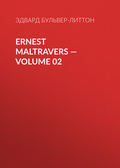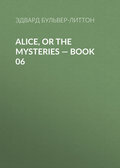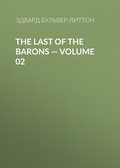
Эдвард Бульвер-Литтон
Kenelm Chillingly — Volume 05
"The Creator has gifted the whole universe with language, but few are the hearts that can interpret it. Happy those to whom it is no foreign tongue, acquired imperfectly with care and pain, but rather a native language, learned unconsciously from the lips of the great mother. To them the butterfly's wing may well buoy into heaven a fairy's soul!"
When he had thus said Lily turned, and for the first time attentively looked into his dark soft eyes; then instinctively she laid her light hand on his arm, and said in a low voice, "Talk on; talk thus: I like to hear you."
But Kenelm did not talk on. They had now arrived at the garden-gate of Mrs. Cameron's cottage, and the elder persons in advance paused at the gate and walked with them to the house.
It was a long, low, irregular cottage, without pretension to architectural beauty, yet exceedingly picturesque,—a flower-garden, large, but in proportion to the house, with parterres in which the colours were exquisitely assorted, sloping to the grassy margin of the rivulet, where the stream expanded into a lake-like basin, narrowed at either end by locks, from which with gentle sound flowed shallow waterfalls. By the banks was a rustic seat, half overshadowed by the drooping boughs of a vast willow.
The inside of the house was in harmony with the exterior,—cottage-like, but with an unmistakable air of refinement about the rooms, even in the little entrance-hall, which was painted in Pompeian frescos.
"Come and see my butterfly-cage," said Lily, whisperingly.
Kenelm followed her through the window that opened on the garden; and at one end of a small conservatory, or rather greenhouse, was the habitation of these singular favourites. It was as large as a small room; three sides of it formed by minute wirework, with occasional draperies of muslin or other slight material, and covered at intervals, sometimes within, sometimes without, by dainty creepers; a tiny cistern in the centre, from which upsprang a sparkling jet. Lily cautiously lifted a sash-door and glided in, closing it behind her. Her entrance set in movement a multitude of gossamer wings, some fluttering round her, some more boldly settling on her hair or dress. Kenelm thought she had not vainly boasted when she said that some of the creatures had learned to know her. She released the Emperor of Morocco from her hat; it circled round her fearlessly, and then vanished amidst the leaves of the creepers. Lily opened the door and came out.
"I have heard of a philosopher who tamed a wasp," said Kenelm, "but never before of a young lady who tamed butterflies."
"No," said Lily, proudly; "I believe I am the first who attempted it. I don't think I should have attempted it if I had been told that others had succeeded before me. Not that I have succeeded quite. No matter; if they don't love me, I love them."
They re-entered the drawing-room, and Mrs. Cameron addressed Kenelm.
"Do you know much of this part of the country, Mr. Chillingly?"
"It is quite new to me, and more rural than many districts farther from London."
"That is the good fortune of most of our home counties," said Mr. Braefield; "they escape the smoke and din of manufacturing towns, and agricultural science has not demolished their leafy hedgerows. The walks through our green lanes are as much bordered with convolvulus and honeysuckle as they were when Izaak Walton sauntered through them to angle in that stream!"
"Does tradition say that he angled in that stream? I thought his haunts were rather on the other side of London."
"Possibly; I am not learned in Walton or in his art, but there is an old summer-house, on the other side of the lock yonder, on which is carved the name of Izaak Walton, but whether by his own hand or another's who shall say? Has Mr. Melville been here lately, Mrs. Cameron?"
"No, not for several months."
"He has had a glorious success this year. We may hope that at last his genius is acknowledged by the world. I meant to buy his picture, but I was not in time: a Manchester man was before me."
"Who is Mr. Melville? any relation to you?" whispered Kenelm to Lily.
"Relation,—I scarcely know. Yes, I suppose so, because he is my guardian. But if he were the nearest relation on earth, I could not love him more," said Lily, with impulsive eagerness, her cheeks flushing, her eyes filling with tears.
"And he is an artist,—a painter?" asked Kenelm.
"Oh, yes; no one paints such beautiful pictures,—no one so clever, no one so kind."
Kenelm strove to recollect if he had ever heard the name of Melville as a painter, but in vain. Kenelm, however, knew but little of painters: they were not in his way; and he owned to himself, very humbly, that there might be many a living painter of eminent renown whose name and works would be strange to him.
He glanced round the wall; Lily interpreted his look. "There are no pictures of his here," said she; "there is one in my own room. I will show it you when you come again."
"And now," said Mr. Braefield, rising, "I must just have a word with your gardener, and then go home. We dine earlier here than in London, Mr. Chillingly."
As the two gentlemen, after taking leave, re-entered the hall, Lily followed them and said to Kenelm, "What time will you come to-morrow to see the picture?"
Kenelm averted his head, and then replied, not with his wonted courtesy, but briefly and brusquely,—
"I fear I cannot call to-morrow. I shall be far away by sunrise."
Lily made no answer, but turned back into the room.
Mr. Braefield found the gardener watering a flower-border, conferred with him about the heart's-ease, and then joined Kenelm, who had halted a few yards beyond the garden-gate.
"A pretty little place that," said Mr. Braefield, with a sort of lordly compassion, as became the owner of Braefieldville. "What I call quaint."
"Yes, quaint," echoed Kenelm, abstractedly.
"It is always the case with houses enlarged by degrees. I have heard my poor mother say that when Melville or Mrs. Cameron first bought it, it was little better than a mere labourer's cottage, with a field attached to it. And two or three years afterwards a room or so more was built, and a bit of the field taken in for a garden; and then by degrees the whole part now inhabited by the family was built, leaving only the old cottage as a scullery and washhouse; and the whole field was turned into the garden, as you see. But whether it was Melville's money or the aunt's that did it, I don't know. More likely the aunt's. I don't see what interest Melville has in the place: he does not go there often, I fancy; it is not his home."
"Mr. Melville, it seems, is a painter, and, from what I heard you say, a successful one."
"I fancy he had little success before this year. But surely you saw his pictures at the Exhibition?"
"I am ashamed to say I have not been to the Exhibition."
"You surprise me. However, Melville had three pictures there,—all very good; but the one I wished to buy made much more sensation than the others, and has suddenly lifted him from obscurity into fame."
"He appears to be a relation of Miss Mordaunt's, but so distant a one that she could not even tell me what grade of cousinship he could claim."
"Nor can I. He is her guardian, I know. The relationship, if any, must, as you say, be very distant; for Melville is of humble extraction, while any one can see that Mrs. Cameron is a thorough gentlewoman, and Lily Mordaunt is her sister's child. I have heard my mother say that it was Melville, then a very young man, who bought the cottage, perhaps with Mrs. Cameron's money; saying it was for a widowed lady, whose husband had left her with very small means. And when Mrs. Cameron arrived with Lily, then a mere infant, she was in deep mourning, and a very young woman herself,—pretty too. If Melville had been a frequent visitor then, of course there would have been scandal; but he very seldom came, and when he did, he lodged in a cottage, Cromwell Lodge, on the other side of the brook; now and then bringing with him a fellow-lodger,—some other young artist, I suppose, for the sake of angling. So there could be no cause for scandal, and nothing can be more blameless than poor Mrs. Cameron's life. My mother, who then resided at Braefieldville, took a great fancy to both Lily and her aunt, and when by degrees the cottage grew into a genteel sort of place, the few gentry in the neighbourhood followed my mother's example and were very kind to Mrs. Cameron, so that she has now her place in the society about here, and is much liked."
"And Mr. Melville?—does he still very seldom come here?"
"To say truth, he has not been at all since I settled at Braefieldville. The place was left to my mother for her life, and I was not much there during her occupation. In fact, I was then a junior partner in our firm, and conducted the branch business in New York, coming over to England for my holiday once a year or so. When my mother died, there was much to arrange before I could settle personally in England, and I did not come to settle at Braefieldville till I married. I did see Melville on one of my visits to the place some years ago; but, between ourselves, he is not the sort of person whose intimate acquaintance one would wish to court. My mother told me he was an idle, dissipated man, and I have heard from others that he was very unsteady. Mr. ——-, the great painter, told me that he was a loose fish; and I suppose his habits were against his getting on, till this year, when, perhaps, by a lucky accident, he has painted a picture that raises him to the top of the tree. But is not Miss Lily wondrously nice to look at? What a pity her education has been so much neglected!"
"Has it?"
"Have not you discovered that already? She has not had even a music-master, though my wife says she has a good ear, and can sing prettily enough. As for reading I don't think she has read anything but fairy tales and poetry, and such silly stuff. However, she is very young yet; and now that her guardian can sell his pictures, it is to be hoped that he will do more justice to his ward. Painters and actors are not so regular in their private lives as we plain men are, and great allowance is to be made for them; still, every one is bound to do his duty. I am sure you agree with me?"
"Certainly," said Kenelm, with an emphasis which startled the merchant. "That is an admirable maxim of yours: it seems a commonplace, yet how often, when it is put into our heads, it strikes as a novelty! A duty may be a very difficult thing, a very disagreeable thing, and, what is strange, it is often a very invisible thing. It is present,—close before us, and yet we don't see it; somebody shouts its name in our ears, 'Duty,' and straight it towers before us a grim giant. Pardon me if I leave you: I can't stay to dine. Duty summons me elsewhere. Make my excuses to Mrs. Braefield."
Before Mr. Braefield could recover his self-possession, Kenelm had vaulted over a stile and was gone.







